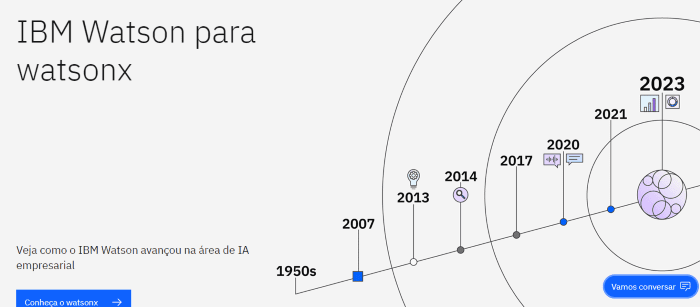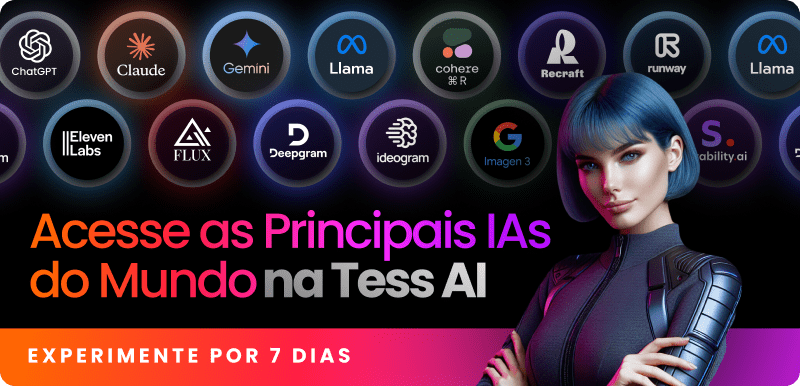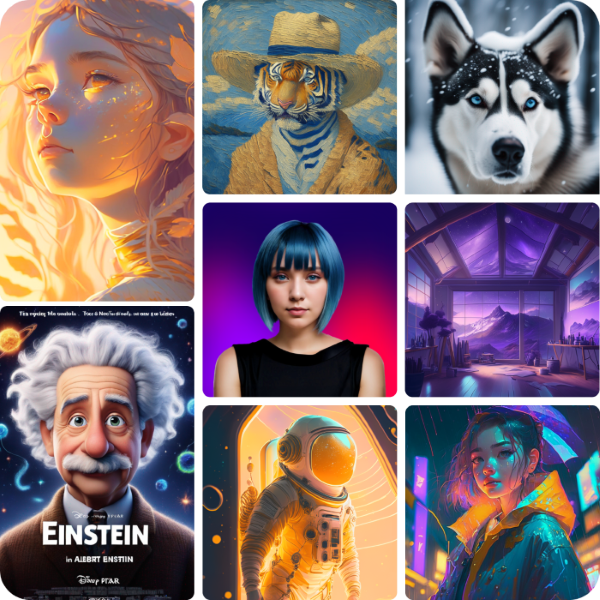There are countless examples of artificial intelligence in our daily lives, from facial recognition systems to more complex systems such as content search engines.
Although many cases go unnoticed, it is already a practice widely adopted by the market due to its importance. In this article, we'll explore the applications of artificial intelligence (AI) in everyday life. Read on to find out more!
What is Artificial Intelligence?
Artificial Intelligence is a technology that makes it possible to build "intelligent machines" capable of performing tasks that normally require human intelligence. These machines learn through experience, perceive changes and adjust to them.
Although AI is an interdisciplinary science with various approaches, advances in Machine Learning and Deep Learning, in particular, are creating a paradigm shift in practically every sector.
From the development of autonomous cars to the growth of intelligent assistants like Siri and Alexa that are known worldwide; AI is becoming more and more present in everyday life - and an area in which companies from all sectors are investing.
Meet Tess AI, the Pareto AI
Before we explore examples of AI applied in everyday life, it is important to introduce Tess AIPareto's AI, which brings together automated solutions to optimize your time. Many of these solutions will be evident in the examples we'll cover throughout the article.
Based on renowned pre-trained models such as GPT-4, Dall-E 3, Stable Diffusion 3, Claude 3.5, LIama, Ideogram 2.0, among others, and Tess AI's own exclusive models, the platform is trained on comprehensive data sets. Tess AI simplifies processes: you provide the idea, and the AI does the rest.
Tess AI offers more than 200 AI models ready to perform tasks in various areas, such as marketing, sales, design and programming. With it, you can create emails, summarize texts, plan campaigns, generate images and much more.
In addition, you can create and publish your own unique AIs to solve personal and professional problems. These AIs can be kept for private use or shared publicly. Interested? Explore more about Tess AI, the 6th Best AI in the World at G2's Software Awards!
17 Examples of Artificial Intelligence in Everyday Life
Now that you know the concept and importance of AI in automating processes and tasks, and have been introduced to a leading and efficient platform for managing various steps, let's explore other practical examples of this technology in everyday life.
1. Routing apps

Google Maps is classified as the leading GPS application, because it covers a greater expanse of the globe than any other competitor, mapping not only more than 220 countries, but also including hundreds of millions of businesses and locations in its vast cartographic data set.
The transportation landscape has changed with the introduction of new technologies that improve the passenger experience. Renowned apps such as Google Maps, Waze and Uber now incorporate AI into their processes.
In this case, Google Maps is renowned for its intuitive interface, advanced features including satellite view and seamless integration with other company services.
Standing out as an advanced AI application, it predicts the time of arrival at the destination and provides real-time information on travel and the location of passengers. It also suggests more efficient routes based on historical data.
(Source: GIS Geography. 10 GPS Apps for Navigation [Android and iOS]. November 2023)
2. Virtual Assistants

Artificial Intelligence goes far beyond simply optimizing tasks or processes; in some cases, it plays a key role in collaboration with virtual assistants such as Siri, Cortana, Alexa and Google Assistant.
The AI techniques employed by these assistants enable a dynamic exchange of information and actions. When requesting a specific demand, the AI validates the entire history of interactions, adapting progressively to provide more precise and personalized results.
The highlight is the growing intelligence of these assistants, improving every step of the process. Now it's no longer necessary to be as specific with commands as it was a few years ago. An example of this is the ability to identify and filter out background noise, which previously interfered with voice commands.
In this sense, Siri has a wide variety of use cases, ranging from simple everyday tasks to integration with other Apple applications and devices. Some examples of use cases include:
- Device commands;
- Sending messages and calls;
- Navigation and traffic information;
- Music and entertainment control;
- Language translation, etc..
This evolution highlights the ability of virtual assistants to integrate more intelligently and effectively into users' routines, providing an increasingly intuitive and personalized experience.
(Source: Apple. Siri)
3. E-mail address

Today, many email services, such as Gmail and Outlook, use AI to detect SPAM messages and prevent inbox overload.
A spam filter uses various rules and algorithms to reduce the amount of unwanted messages, not only avoiding unsolicited ads, but also preventing credit card fraud and identity theft.
In this context, AI works behind the SPAM filter, analyzing metadata from email marketing to identify specific words or phrases.
In addition, AI plays an essential role in optimizing various email-related activities. See other practical examples:
- Personalization: AI in email adapts content based on the customer's history of interactions, preferences and behavior. This results in more relevant and personalized messages for each recipient;
- A/B testing: with the help of AI, A/B testing is improved, allowing automated analysis of results. Algorithms identify the most effective variations, continually adjusting sending strategies to maximize engagement and conversion rates;
- Interactive Content : AI is key to creating interactive email marketing. Using data such as browsing behavior, purchase history and preferences, AI automatically personalizes the content of emails, making them more engaging and tailored to the individual needs of each recipient.
4. Search engines

Google stands out as one of the main examples of the application of AI in search engines. This technology enables faster search results and the ability to recognize synonyms, related subjects and even sound similarities between letters.
As people use Google, AI learns about their search intentions and behaviors, providing continuous improvement for users.
In recent years, Google has incorporated elements of AI to improve the ranking of websites and, more recently, it has started using AI to recommend specific parts of videos based on search queries. The notable example is RankBrain, a key piece in Google's AI arsenal. Here's why:
- Understanding Complex Queries: RankBrain excels at interpreting complex queries in Google search engines, going beyond simple keyword matching. It focuses on understanding the meaning behind the queries, providing more relevant answers;
- Machine Learning and Data Analysis: equipped with advanced techniques, RankBrain analyzes large volumes of search data. Through this process, the system learns patterns and improves its ability to interpret new queries and provide results that are better adapted to users' needs;
- Continuous Adaptation and Integration into the Search Algorithm: RankBrain stands out for its flexibility in adapting dynamically to changes in search trends. It integrates organically into Google's search algorithm, collaborating with other components to improve the accuracy and relevance of results.
(Source: Google Blog. How Artificial Intelligence boosts excellent search results. 2022; Prime Web Agency. Google RankBrain)
5. Streaming platforms

"Streaming is the instantaneous transmission of data over the internet, including audio, video and other types of multimedia content.
Streaming platforms such as Netflix, Deezer and Spotify enhance the user experience and extend usage time through personalized recommendation systems.
These companies, notably Netflix, stand out globally by employing AI in various areas to optimize operations and improve the user experience.
It essentially learns from the data that is provided and then uses its own database to provide the content that best meets your expectations. Here's how it works:
- Data Analysis for Content Production: Netflix uses AI to analyze large volumes of data on views and preferences, enabling informed decisions in the production of new content. This includes the choice of cast, storylines and genres most likely to captivate the audience.
- Personalization for Content Recommendation: Netflix uses machine learning algorithms to improve movie recommendations. By analyzing viewing history, preferences and behavior patterns, the platform offers more relevant content suggestions for each user.
(Source: Analytics Insight. Top 10 Ways Netflix is Using Artificial Intelligence in 2022)
6. Facial Recognition

The application of facial recognition ranges from mobile devices to complex systems, where it is necessary to use the face to unlock the system employed, making use of AI and deep learning in this process.
During set-up, the system thoroughly scans the user's face, identifying various points as markers to enable facial recognition at different angles.
This makes it easier to unlock devices in different lighting conditions and prevents unauthorized access. Here are some use cases:
- Face ID phone unlockingunlocking a phone with facial recognition, such as Apple Face ID, is common practice. During configuration, the system scans the face, identifying various points as references to enable recognition of the authorized person.
- Face Identification for Access to PlacesThis case can cover homes/condominiums, airports, companies, events, etc., in order to provide security, efficiency and convenience to these sectors.
(Sources: TechTarget. Facial Recognition. December, 2022)
7. The Use of AI in Social Media

Social networks have evolved beyond being mere platforms for interaction; they are now true allies.
A practical example is YouTubewhich uses data such as tags and demographic information to suggest personalized content, taking into account not only your profile, but also the consumption patterns of other users with similar interests.
However, AI not only benefits the platforms, but also the users. Here are some of the positive points of integrating this technology into everyday life from both perspectives.
From the Users' Side:
Example 1: users benefit from AI to personalize their feeds, receiving suggestions from friends, pages and ads based on their preferences and history of interactions .
Example 2: AI tools are used to quickly and efficiently create content, generating captions, hashtags and visual designs. This automation speeds up the sharing process, making content creation more accessible and dynamic.
Within the Platforms:
Example 1: AI algorithms are used to automatically identify inappropriate content, such as hate speech and spam. This application contributes to efficient and safe moderation of the platform, ensuring a more positive environment.
Example 2: platforms use AI to analyze user behavior patterns, offering personalized suggestions of friends, groups and posts. This process aims to provide a more engaging experience, increasing the chances of conversion.
8. Smart Keyboard

Smart keyboards use machine learning in their algorithms to identify language errors, make text correction suggestions and can be implemented in text applications to become accustomed to user communication over time.
They are now able to guide the user's writing style and predict the words and emojis to be used, making text messages faster and more convenient. A notable example is Gboard, Google's keyboard, which offers several AI-driven features. Check out some of them:
- Voice typing: AI converts the user's speech into text, allowing information to be entered without using a keyboard. It uses voice recognition technologies to interpret and transcribe spoken words into written text.
- Multi-language writing: this function is based on natural language processing algorithms. By analyzing linguistic patterns and structures, the AI is able to automatically adapt to the user's desired language, providing a versatile, multilingual writing experience.
- Automatic Correction: the AI analyzes the context of the sentence or sequence of words and makes automatic corrections to improve the grammar, spelling or cohesion of the text. This feature helps to improve the quality of written communication on an ongoing basis.
(Source: Google Blog. Gboard: the smartest keyboard on Android)
9. Video games

The application of AI in the games market has significant potential, not only to reshape the design of games, but also to redefine their very essence.
If these systems are successful, they have the capacity to usher in new categories of AI-driven games, providing lasting entertainment, engagement and retention for players. Below is some recent information on how AI is shaping a new category of games:
1. Generative agents: in 2023, researchers from Stanford and Google published a study on the application of generative agents in games like The Sims and SimCity. Using natural language (NL) and trained with data from social networks, in the future the characters will be able to interact as if they were humans speaking, on topics such as friendship, relationships, etc.
2. Personalization: the personalization of games will be increasingly present with the advance of AIs. In the case of the role-playing game Spellbrush's Arrowmancer, players can create unique anime characters, covering both art and combat skills.
3. AI narrative: the use of language models makes it possible for players to interact with an AI narrator. A practical example is Latitude's AI Dungeon, a text-based open adventure game. Here, the AI takes on the role of dungeon master, allowing players to explore AI-generated universes in an unlimited and dynamic way.
4. Dynamic world-building: with the use of generative models, games can create worlds and levels automatically and in real time. A practical example is Valve's Left 4 Dead, which uses an AI Director to dynamically adjust the pace, difficulty and atmosphere of the game based on the actions and locations of the players.
5. An AI Copilot for Each Game: AI can also act as support for players. In the case of Microsoft's Minecraft game, the AI copilot is currently under development, using DALL-E and Github Copilot to guide players through asset creation and logic via natural language prompts.
The demand for generative agents, especially in simulation games, is significant, with 61% of game studios interested in experimenting with AI NPCs. The expectation is that digital characters will soon become commonplace in our daily social interactions.
(Source: Andreessen Horowitz. The NeverEnding Game: How AI Will Create a New Category of Games. July, 2023)
Examples of Artificial Intelligence in Business
After checking out various examples of Artificial Intelligence applied in everyday life, we've separated out the main practical examples of this technology applied strategically in companies. Check them out!
10. Image generation
Artificial Intelligence plays an important role in image generation. This application impacts various sectors such as marketing, graphic design, product development, among others.
This technology provides efficiency by generating personalized visual content quickly and creatively. In this context, Tess AI saves time and resources, highlighting its significant potential in business operations.
With this feature, you'll have high-quality images generated in a matter of seconds. Simply enter your idea and refine the parameters with simple text commands to create something truly unique.
Try Tess AI for 7 days with a satisfaction guarantee or your money back!
11. User Service

With regard to the examples implemented in user service, it is clear to understand that the most common are the Chatbots.
Through the user's interaction with the chat, the AI executes the conversation based on the configuration and information initially implemented. In this way, it is possible to speed up the interaction and scale the service.
By implementing chatbots, companies can free up staff time for other activities and still obtain important information from their customers.
Companies are adopting AI as a strategy to stand out in the market. Coca-Cola FEMSA, the world's largest Coca-Cola franchise, for example, has chosen to use technology to digitize interaction with store owners, using WhatsApp as a channel.
Through its e-commerce platform Yalo, which uses AI, Coca-Cola has established an effective connection with merchants. This has made it possible to serve more than 1.5 million stores via WhatsApp, generating a turnover of $1 billion in just one year.
(Source: Yalo. Coca-Cola FEMSA digitizes over 1 million points of sale in Latin America. July, 2023)
12. Banking and Finance

Banks and financial institutions represent exemplary cases in the use of AI to optimize and automate processes. This ranges from credit risk analysis to virtual assistants and financial analysis.
When you access your bank account over the phone, banks use AI and machine learning to analyze your handwriting. This analysis compares your digital signature with the one registered at the branch, ensuring security in transactions such as check approval.
These technologies boost operational efficiency by speeding up operations carried out by software. The result is faster execution of tasks, reducing waiting times and operating costs.
JPMorgan stands out as a benchmark for technology and innovation in the banking sector. Its considerable investments in AI and related technologies are aimed at improving services and operations.
AI is applied in various areas, from data analysis, market forecasting and risk management to customer service. The bank is also actively involved in the development of emerging technologies such as blockchain and cryptocurrencies.
JPMorgan leads the ranking of AI implementation among the 23 largest banks in North America and Europe. Evaluating talent, innovation, leadership in AI strategy and implementation, as well as responsible practices, JPMorgan achieved the highest score, with 65%.
(Source: Insider Intelligence. UK-based fintech Evident creates the first AI Index to track banks' progress in implementation)
13. E-commerce management

By employing advanced technologies such as AI, the challenges faced by e-commerce managers can be overcome in innovative ways. AI redefines the way companies interact with customers, bringing advanced predictions and operational efficiency, as presented in the following examples:
Chatbot in e-commerce: according to Bain & Company, an inspiring example of the application of AI in e-commerce management is the Carrefour initiative. The company used AI to create a chatbot that guides customers through various shopping tasks, from drawing up meal plans to restocking pantries.
Product recommendation and search: e-commerce platforms can offer personalized recommendations to consumers based on their interests and preferences, improving the user experience and increasing the chances of conversion.
Creating backdrops for photos: AI can create backdrops for photos of furniture, saving resources that would otherwise be spent on lengthy image editing or setting up backdrops for photos. See how it works at Tess AI:
Explore new possibilities and boost your e-commerce with Tess AI! Create your account now.
14. Marketing

The application of AI in marketing has a wide scope, ranging from optimizing campaigns and improving the customer experience to boosting ROI.
According to McKinsey, there is an expected increase of 463 billion dollars in the global economy with the productivity gains brought about by the application of AI in marketing. And the impacts on marketing processes are significant. Here are some of them:
Fast and Efficient Content Creation: Generative Artificial Intelligence enables automated and personalized content generation, guaranteeing uniformity in tone of voice, writing style and format. This speeds up the creation process, allowing you to create mass emails, marketing messages and ads for different languages, audiences and regions.
Better Data Work: AI analyzes large volumes of data quickly and accurately, providing companies with valuable insights into consumer behavior and improving marketing strategies.
SEO optimization: AI helps optimize content for search engines and create new blog articles, improving ranking in search results. This increases the company's visibility, generating more organic traffic to the site.
(Source: McKinsey. The economic potential of generative AI: The next productivity frontier. June, 2023)
15. Sales

As AI continues to transform business scenarios, its positive impact on sales is also becoming noticeable.
As highlighted in the McKinsey report, the impacts of implementing AI in sales are significant, with an expected increase of 486 billion dollars in the global economy due to productivity gains from applying AI in this sector. Let's delve into these details:
Increased Likelihood of Sales: AI, through the analysis of customer data and behavior, increases the likelihood of sales success. By identifying patterns and preferences, AI offers valuable insights that empower sales teams to approach customers more effectively, increasing conversion rates.
Improved Lead Development: by providing more accurate information about the customer's stage of readiness, AI enables a more personalized and strategic approach to sales interactions. This optimizes the sales cycle, making approaches more assertive and increasing the chances of closing successful deals.
(Source: McKinsey. The economic potential of generative AI: The next productivity frontier. June, 2023)
16. Human Resources

In the application of AI in the human resources sector, the great potential for collecting data and identifying ideal profiles for specific vacancies is clear, aligning candidates with the desired cultural fit and the necessary technical knowledge.
Cross-referencing information about a candidate's behavior with the skills required for the position is in itself an example of the use of technology, which helps to identify whether the candidate fits the position available and whether they can perform well in the company.
AI also plays an important role in improving the organizational climate. AI software facilitates the analysis of the climate survey, as well as interpreting the data obtained and generating reports with more specific actions to maintain employee engagement.
In this sense, IBM Watson is recognized as a global leader in machine learning and AI applied to the Human Resources (HR) sector.
The solutions developed by IBM Watson in the HR area use machine learning to identify, hire and keep the best talent in organizations.
The AI-based recruitment tools offered by IBM Watson help companies to automate hiring processes, reduce prejudice and make data-driven decisions.
(Source: IBM. The business case for AI in HR)
17. Digital Security

In the field of digital security with AI, implementation is generally based on Deep Learningenabling the system to learn automatically from the data provided.
Once this data has been entered, the process of analyzing patterns to prevent attacks begins, and this cycle continues in a loop to optimize the system's accuracy.
In this context, AI can analyze behavior to create new triggers, thus strengthening security. This is achieved through data collection, which reveals anomalies in the access location, password entry, user ID, among other inconsistencies.
Cybereason offers an AI-driven cybersecurity platform to monitor, detect and analyze threats, providing a comprehensive view of enterprise security.
This makes it possible to anticipate risks, including sophisticated cyberattacks, expansion of the attack surface, data explosion and growing infrastructure complexity. Cybereason's AI-automated detection technology benefits companies of all sizes by simplifying threat identification.
(Source: Cybereason; IBM. Artificial intelligence cybersecurity)
Conclusion
As you can see, we are impacted by AI on a daily basis, whether it's using smartphones, surfing the internet, sending emails or listening to music on streaming platforms, AI is impacting our daily choices.
It's no exaggeration to predict that technology will continue to develop and become increasingly essential in all sectors of business and in practically every aspect of our daily lives, making our routine more convenient and productive.
Don't be left out of this technological revolution. Start exploring Tess AI today, the platform that integrates the world's greatest intelligences, and transform the way you work and live.






